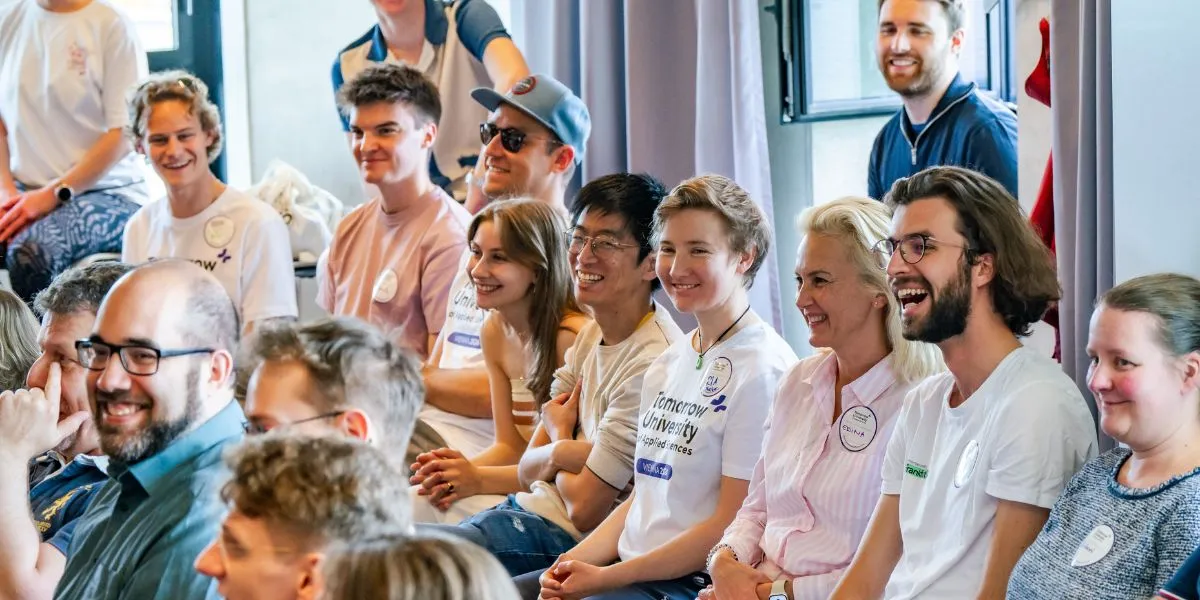The Future of AI: Ethical Leadership Matters
AI is powerful—but without ethical leadership, it’s also risky. In this article, we explore how responsible leaders can shape AI’s role in society by combining tech knowledge with values-based decision-making. See also our post on how to use AI effectively.
.webp)
The German AI Association hosted its first conference on Large European AI Models (LEAM) to discuss the importance of large, expensive transformer models that are capable of natural language understanding and generation. These models have numerous applications, including ChatGPT and DeepL Write. Fabian Westerheide, CEO of AI for Humans and an AI-tech investor, attended the conference and emphasized the importance of investing in an open-source model for Europe to keep up with the US and China.
The German AI Association hosted its first AI Conference on Large European AI Models, or LEAM. But what are these “LEAM” — and why are they crucial to the future of tech and industry in the EU? To answer these questions, I interviewed AI and tech investor Fabian Westerheide for his insights and outlook on the topic. Fabian is the CEO of AI for Humans and an international expert on Artificial Intelligence strategy, entrepreneur, and venture capitalist. He advises governmental institutions, including the European Commission, the European Space Agency, the German parliament, the Chinese ministry of technology, and departments such as the secretary of defense and foreign ministry, as well as Fortune 500 companies, think tanks, and startups. Furthermore, Fabian is the Founder of Rise of AI, organizing events for leaders in AI, and Managing Partner at Asgard — human VC for AI.
Starting out
Fabian started out building companies with Team Europe, which included well-known names such as Gründerszene, Mister Spex, and Lieferheld. After running his own business selling wedding dresses, he decided he wanted to do something impactful for himself and society. His passion led him to research the field of deep tech, which as of 2013/14 was buzzing with the Internet of Things and AI, and was on the cusp of a breakthrough.
“In 2013/14, I had the feeling that we had the beginning of another wave of something big, so I just dug into it."
A year later, a breakthrough was achieved with deep learning, leading to Google Deep Mind’s development of AlphaGo in 2016 and, of course, making headlines with ChatGPT this year.
Fabian decided to get even more invested in AI. Bringing together innovators and minds from across the field, he started his first AI meetups, which led to him founding the Rise of AI conference that he runs today together with his wife.
“I learned over the years who I am, how I work the best way, and what my value is to society. My value is to see trends, to be very good on the financial side, and also to network and to see opportunities. Today I'm just connecting dots and connecting people and helping to meet and come together so that they start their own companies, own projects, own research endeavors, so that they get educated and make the right decisions.”
Over the years, he says, this has led him to focus his role, not as a “front runner,” but on supporting others from the sidelines as an ecosystem builder, building a strong AI network in Germany and beyond.
Quo VAIdis, Europe?
On the 24th of January, Fabian took part in the LEAM Conference hosted by the German AI Association — a milestone for national and European efforts in accelerating the next generation of AI. LEAM stands for Large European AI Models. These transformative models have reached the point of natural language understanding and generation (NLU/NLG) and can be found, for instance, in ChatGPT but also DeepL Write.
“Deep learning is really good for clustering and segmenting data,” Fabian explains. “Image recognition is the typical one, discovering what is a cat and not a cat on YouTube. That is the core trend that came. And building on this over the years, we had what's called transformation or transformer models, it is a mixture of various existing forms of deep learning combined with other technologies. And these transformer models have been around, let's say, the last two to three years. And they are hugely expensive to train.”
Looking back, Fabian argues that we have come a long way — but not without a hefty price tag. “So 10 years ago, everyone was building their own small models. Today we have large, expensive models, but way easier to build on, on top. I once invested in a company that was building a model which could answer emails. And it cost roughly two to three million to develop it. Half of this was state finance, and half of it was private finance. Today, you can use OpenAI and build on top of it, and you're saving the first four million investment. However, OpenAI has invested over one billion into it. And is currently investing roughly three million a day just to run the whole system.”
But why does the “E” matter so much? Fabian explains that one of the key discussions around AI is the question of control — and investment. The LEAM conference was designed to bring together leading German companies and innovators, who fielded a clear concept and call to action to the government: an investment of 350 million euros to build an open-source model that could benefit all Europeans.
“We want to have a European model, which can build national models and which should be open source – in contrast to OpenAI (developers of ChatGPT), which is not “open.” It should have integration for local languages, like German, Dutch, French, and Swiss German. So that hopefully, one day we can have a large European model, which is the open source core for all companies to monetize it, for universities to build on it so that we have a multitude of national or special purpose versions of ChatGPT.”
However, Fabian argues that Germany and Europe have been slow movers — and are on a path to be left behind.
Right now, he explains, the US and China are dominating the AI field with their models, leaving European industry and consumers dependent on outside ecosystems. In the US, Fabian argues, the government (for instance, through the military’s DARPA) and investors have been eager to invest in the field without interfering in the innovative process. “They just pre-finance at the very fundamental level and therefore help to generate the innovation, but let the money flow freely and let companies like open AI monetize on their own terms.” The other great AI force is of course, China, which is also pouring resources into the development, set to more than double its investment in AI to nearly $27 billion by 2026, against the worrying backdrop, however, of heavy state censorship and control of such technologies.
Like many at the conference, Fabian is frustrated with what he identifies as a lack of bold investing and barriers to innovation on the Old Continent.
He argues, criticizing that European governments are creating difficult conditions for market entry due to regulation barriers, bureaucracy, and a tight governmental grip on projects. He focuses on the German government especially, saying that several billion euros were promised to the sector in 2018 — but never arrived.
“The much-needed money never arrived in the ecosystem. Yes, we have small pilots here. I know them, they cost four million euros. You have some research centers that got upgrades with a couple of new professors, but I think roughly 1-1.5 billion euros were spent, and the rest is gone, just allocated to other things.”
A potential future scenario?
“Our governments, our legal entities, and enterprises, they will be forced to use either an American version or Chinese one, or a less good European one.”
A European joint and open source effort, Fabian argues, “would solve a lot of headaches,” eliminating the need for doing the research and groundwork over and over again, allowing AI to spread deeper into various industries and especially to smaller companies that don’t have research units or the money for this. Overall, Fabian believes that a mentality change is needed — not just when it comes to solving technological issues but also addressing social welfare. He urges us to prioritize good health and future-proof education instead of focusing on an “elbow mentality” and productivity for its own sake.
“We need lifetime, lifelong education, heavily investing in transforming all those people in jobs, which will not be replaced by AI — but automation needs new people, and it will replace other tasks.”
For Fabian, concepts like Basic Universal Income will be a necessary aspect of this process, as technological progress will ultimately change the nature of why, how, and even if we work.
Problem first — technology second
Over the coming year, AI tools that can be integrated into businesses, learning and replacing manual tasks, will be the “next big wave” that Fabian will be looking to invest in. Fabian’s advice to young founders? “You need teams who are solving real problems. Don't come with technology and then look for a problem. A lot of AI people have done it, and it's very tricky. You need to understand your customer or your potential customers, their value chains, and their problems, and then you go in and say, “Hey, I have the technology.” He also points out the importance of moving fast: “Don't develop something for two or three years and then go on the market. You need to find solutions — build a “new, used car,” and work with what is available. Don't always try to be the edgiest; just be quicker to apply technology. I want to see more people accepting what's out there and being smart enough to create a valuable business for this.”
To learn how to problem-solve with AI and gain 21st-century skills in this rapidly growing field, check out our B.Sc. in Artificial Intelligence & Sustainable Technologies.

.svg)
.svg)
.svg)



.webp)




.webp)
